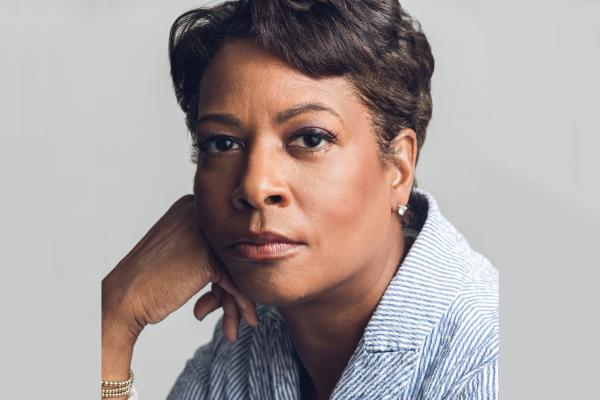Dawn Porter
National Humanities Medal
2023

—Kevin Scanlon

—Kevin Scanlon
Despite having directed or produced more than a dozen documentaries, Dawn Porter did not begin her career thinking she’d end up in film.
She actually studied law at Georgetown University Law School and was happy at her D.C. firm, where she served as a litigator. Then her best friend at work died.
“She was in her 30s, and it was just like a bolt of lightning,” Porter says. “I started thinking, ‘What do I want to do?’ I don’t want to just fall into my career.”
She decided to take on the next scary opportunity that came her way, and that was working as the director of standards and practices for ABC News. There, she made legal and ethical calls on journalism coverage and got a behind-the-scenes look at how films were made.
“I thought: ‘I could do this,’” she recalls. She co-executive produced some films and several years later moved over to A&E. There she saw how few filmmakers looked like her.
“There are many African American filmmakers who are fantastic, but we’re a smaller group than we should be.”
So she decided to start directing and producing her own films.
Her first documentary was about segregation in Mississippi, and the violent actions taken by the Mississippi State Sovereignty Commission to preserve it in the 1950s and ’60s.
The project floundered due to a lack of funding, but in the meantime, Porter had been invited to attend a training in Atlanta for public defenders in the South. She decided to follow three of them while they worked on two armed robbery cases. HBO agreed to fund the project.
“Working with the public defenders was life-changing,” says Porter, whose earlier career had been in civil law, not criminal. “I couldn’t believe people were going to jail for life for possession of cocaine. I couldn’t imagine what I was seeing every day.”
That film, Gideon’s Army, premiered in 2013 and won Porter an Emmy nod and a Ridenhour Award. With it, she secured funding for her original documentary called Spies of Mississippi.
After that, projects followed regularly. In 2016, she released Trapped, a documentary about beleaguered abortion clinics in Mississippi, Alabama, and Texas.
The film was named after TRAP laws. (The acronym stands for Targeted Regulation of Abortion Providers.) The laws had successfully closed many clinics in areas that served poorer populations.
“We spent three years traveling to abortion clinics,” Porter recalls. “So much of the abortion story is a poverty story.”
Porter is drawn to political topics, like her work on political advisor, attorney, and civil rights activist Vernon Jordan called Vernon Jordan: Make It Plain. Her John Lewis: Good Trouble was about the congressman and civil rights activist from Georgia.
But she likes to tell stories that aren’t being told. Her perspective as a Black woman matters, Porter points out. Her Netflix documentary Bobby Kennedy for President focused on the Black people who influenced the senator.
“I don’t know that every filmmaker would clue in that that was such a formative part of Bobby Kennedy’s maturation and evolution as a person,” she says.
Porter stays busy. In the past two years, she’s released documentaries about Cirque du Soleil, Luther Vandross, the Supreme Court, and Lady Bird Johnson.
“Because it’s a second career for me, I’m making up for some lost time,” she says. “But I also love what I do, and I feel like if I get the chance to add my voice to some stories, that’s important to try and do.”
Right now, Porter is working on a documentary about Nelson Mandela, the South African freedom fighter who became the country’s first Black head of state, and his wife, Winnie, who is often overlooked.
“She was in prison. She was tortured. She was in solitary confinement,” says Porter. “All these things happened, and I thought, ‘Why don’t we ever talk about these ladies?’”
That is on top of working on a film about the prison Sing Sing for MSNBC and a documentary about three wrongfully convicted men for HBO. Porter’s career has seen her work debut at the SXSW Film Festival and brought her into contact with political and artistic luminaries like Jamie Foxx, Barack Obama, Colin Firth and Bill Clinton. She’s no stranger to accolades but still is touched by the National Humanities Medal honor.
“It’s quite moving and motivating to feel like people recognize what you’re trying to do with your work,” she says. “Being recognized for something that you love so deeply, it’s hard to explain how meaningful that is.”
—Rosalind Early